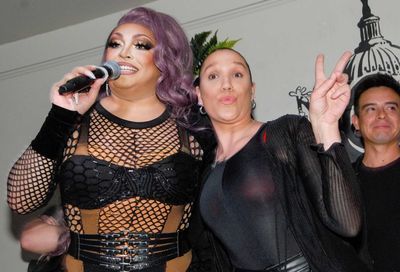Google finally deletes conversion therapy app after protest from LGBTQ activists
Living Hope Ministries calls being gay “a stomach-ulcer-of-a-life”

Google has finally relented to pressure from activists and deleted a pro-conversion therapy app from its Google Play app store.
The tech giant has been hounded for weeks to remove an app by Living Hope Ministries, a Christian ministry that advocates for the widely debunked practice, which claims to change a person’s sexuality or gender identity.
The app is intended to “help homosexuals leave their destructive lifestyles” and calls homosexuality “a stomach-ulcer-of-a-life”.
Despite Amazon, Apple and Microsoft all removing the app from their various stores months ago, Google refused to follow suit, stating that the app didn’t contravene their terms of service.
That decision led to uproar from LGBTQ people, and eventually a Change.org petition that drew over 142,000 signatures demanding Google take action against the app.
But it wasn’t until the Human Rights Campaign decided to suspend Google from its Corporate Equality Index that Google finally decided to take action.
The company, like many in the tech industry, has long touted its perfect 100% score on the index, demonstrating its commitment to and support of LGBTQ equality and pro-LGBTQ employment policies.

In a statement, Google tried to justify the months-long delay in deleting the app.
“[After] consulting with outside advocacy groups, reviewing our policies, and making sure we had a thorough understanding of the app and its relation to conversion therapy, we’ve decided to remove it from the Play Store, consistent with other app stores,” Google said.
HRC president Chad Griffin said that Google had made the “right decision.”
“We applaud Google for making the right decision to pull this app from their online store,” Griffin said. “So-called conversion therapy is a debunked practice that’s tantamount to child abuse and is proven to have dangerous consequences for its victims. Google and other platforms that have pulled this app are taking an important step to protect LGBTQ youth.”
Conversion therapy has been widely and repeatedly debunked by most mainstream medical associations. The so-called therapy can take the form of talk therapy, or more invasive techniques such as aversion or electroshock treatment.
The practice has also been criticized as ineffective and dangerous by a number of former leaders of the ex-gay movement.
Last month, David Matheson, a former “ex-gay” advocate who spent years promoting conversion therapy to LGBTQ Mormons, finally admitted that the practice does not work and should be stopped.
In an interview with Britain’s Channel 4 News, Matheson said that conversion therapy “just can’t” change a person’s sexual orientation, that it “should be stopped” in the U.S., and expressed regret over the harm caused to LGBTQ people by his work.
In January, John Smid — former executive director of Love in Action, a conversion therapy organization — stated that the practice does not work and should be stopped.
Smid, who inspired a character in conversion therapy drama Boy Erased, wrote in a column for the Advocate that organizations still advocating for the practice in 2019 “blithely disregard the mountain of evidence” against it.
And in 2013, Alan Chambers, president of conversion therapy umbrella organization Exodus International, came out as gay and shutterd Exodus for good.
Speaking to Metro Weekly in 2016 that people should be warned against conversion therapy: “This is not something that’s going to work. This is dangerous. It creates shame. It is not something that is going to produce an orientation change in you.”
Chambers said that conversion therapy should be banned for adults, not just minors, and unlike Matheson, both he and Smid are working to make amends for the damage inflicted by their work.
Support Metro Weekly’s Journalism
These are challenging times for news organizations. And yet it’s crucial we stay active and provide vital resources and information to both our local readers and the world. So won’t you please take a moment and consider supporting Metro Weekly with a membership? For as little as $5 a month, you can help ensure Metro Weekly magazine and MetroWeekly.com remain free, viable resources as we provide the best, most diverse, culturally-resonant LGBTQ coverage in both the D.C. region and around the world. Memberships come with exclusive perks and discounts, your own personal digital delivery of each week’s magazine (and an archive), access to our Member's Lounge when it launches this fall, and exclusive members-only items like Metro Weekly Membership Mugs and Tote Bags! Check out all our membership levels here and please join us today!






















